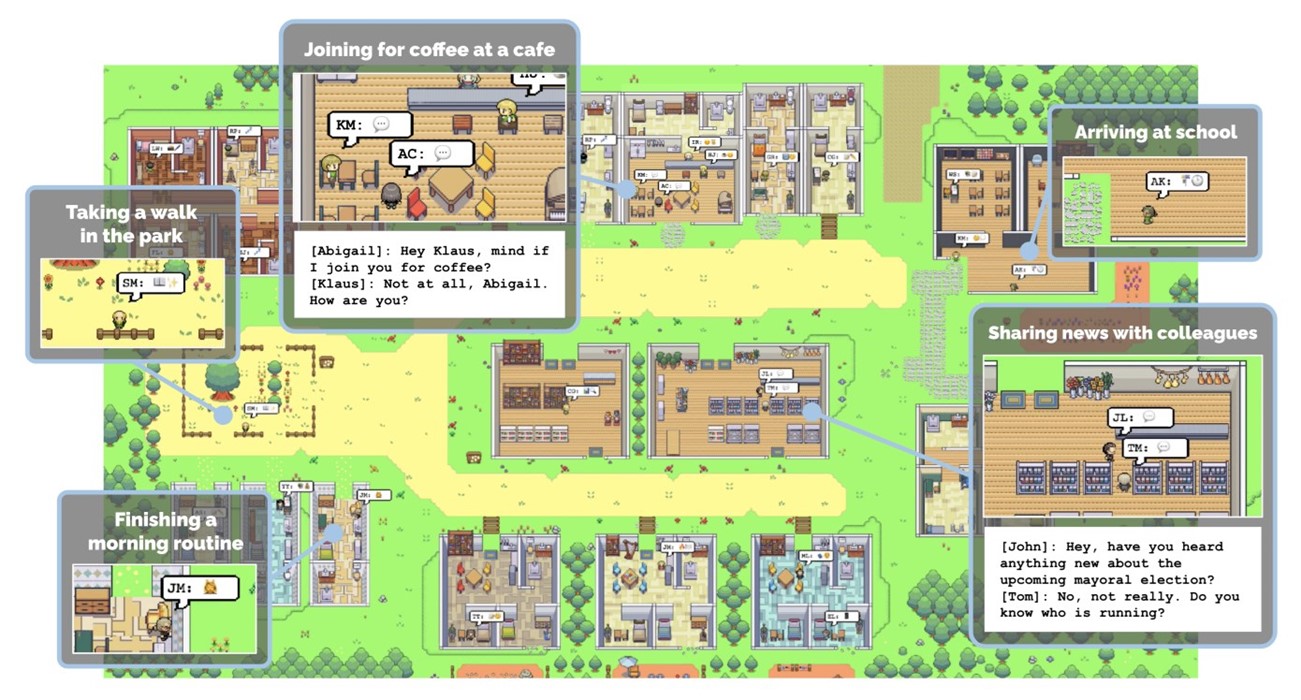Smallville AI experiment Image by Google/Stanford University
The Dawn of AI-Enhanced NPCs
Researchers from Stanford University, in collaboration with Google, have developed a game demo called Smallville, which integrates the AI writing tool ChatGPT (https://openai.com/blog/chatgpt), revolutionizing the way non-playable characters (NPCs) interact via dialogue. In Smallville, NPCs can have dynamic conversations about various subjects, ranging from music composition to local politics. These sophisticated NPCs are also capable of retaining information from previous dialogues and customizing their interactions with players accordingly. According to project researcher Joon Sung Park, this AI technology could be implemented in smaller games within the next year and a half, with broader adoption anticipated in five years. How far the actual implementation might actually go remains to be seen, as skeptics are just as abundant with Take2 CEO Straus Zelnick not believing in AI creating hits like a human could (https://www.gameforest.de/news/ki-in-der-spieleentwicklung-take-two-ceo-glaubt-nicht-an-ki-generierte-hits/)
Industry Skepticism: The Role of AI in Game Writing
Despite assurance from companies like Ubisoft as reported by Kotaku (https://kotaku.com/ubisoft-ai-writing-scriptwriting-ghostwriter-machine-1850250316) and Stanford that AI technology aims to supplement rather than replace game writers, creative professionals have expressed concerns. Ed Stern, a narrative designer at UK studio Splash Damage, highlights the industry-wide skepticism regarding AI-generated dialogue. He points out that while AI could potentially streamline the writing process, human intervention is still necessary to fine-tune every line of dialogue and avoid issues such as derivative writing or inadvertent plagiarism.
AI vs. Artisanal Approach
Many game developers are hesitant to incorporate AI into their creative process. They often prefer a handmade, artisanal approach to crafting game environments and narratives, arguing that AI lacks the heart of human creativity. Moreover, some developers are worried about potential negative effects, as AI-generated content might include offensive language or misrepresent sensitive topics. While it is possible to program AI against offensive behavior, there is a lingering unease around the integration of AI in game development.
AI’s Impact on the Jobs of Game Writers
As AI technology transforms the gaming landscape, industry insiders are wary of the possibility that AI could replace human jobs, particularly for game writers. Creative AI holds the potential to create larger, more immersive gaming experiences; however, there are legitimate concerns about the long-term impact on the livelihoods of writing professionals. The gaming industry is already expensive and complex, with the addition of AI potentially amplifying these challenges.
Conclusion
In conclusion, the implementation of AI in video games, as showcased in the Smallville demo by Stanford University and Google, is set to revolutionize NPC dialogue and bring more dynamic interactions to games. Nevertheless, the industry is skeptical and cautious as they worry about the potential replacement of human creativity and the negative consequences that might arise from AI-generated content. While the technology is aimed at supplementing, not replacing, human writers, its long-term effects on the gaming industry remain to be seen.
